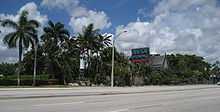Mai-Kai Restaurant

The Mai-Kai is a tiki-themed restaurant located at 3599 North Federal Highway in Oakland Park, Florida. It opened to the public on December 28, 1956, and is one of the few "Grand Polynesian Palaces of Tiki" still in operation today.[1] It is the last restaurant/bar in existence carrying on the traditions of service and serving the original drink recipes of Don the Beachcomber's, and has been listed on the National Register of Historic Places.
History
The Mai-Kai was created by brothers Bob and Jack Thornton. They visited Don the Beachcomber's in Chicago as children and even at that young age said they wanted to open a similar place. When they opened the Mai-Kai they hired away number 2 chef Kenny Lee, number 2 bartender Mariano Licudine and the head Maitre d' Andy Tanato from that particular Don the Beachcomber's along with many staff members.
Their original design cost three-hundred-thousand dollars; it was the most expensive restaurant built in 1956. In its first year it earned over one million dollars, becoming one of the most successful restaurants of its time. It was built in an open field on Federal Highway, on the outskirts of Fort Lauderdale, then only two lanes. Fort Lauderdale in the late 50's was a seasonal place, catering mostly to "snow-birds", and in the first few years the Mai-Kai was only open during the Winter Tourist season.
Originally the roof of the main dining room was open. The constant nuisance of moving dining room guests out of the rain caused them to enclose the roof with glass. That glass roof was opened and closed until maintenance issues kept it closed.
For many years it sold more rum than any location in the United States.
The Mai-Kai became rather expansive in time; it includes eight dining rooms, a bar, tropical gardens with walking paths and waterfalls, a stage in the center to showcase the Polynesian Islander Revue floor show, and a gift shop. The last, and largest, renovation started in 1970 and took two years to complete. Even during these massive construction projects, the Mai-Kai never closed. They stipulated that the work must be done so that customers could not see or hear it. This often meant the work was done in the wee hours of the morning.
In 1970, Jack Thornton sold his interest in the Mai-Kai to his brother Bob as he was struck ill by an aneurysm.
Today, the Mai-Kai is much like it was in the 1960s. A wooden slat bridge is crossed to reach the porte cochere and valets. A maître d' greets visitors, and in the beautiful restrooms there is an attendant, which the restaurant says is "a luxury missing from too many places today".
Today the restaurant is run by Bob's stepson Dave Levy. In 2008 he has undertaken a massive renovation of the building to restore the building and repair damage from Hurricanes Katrina and Wilma.[2]
Mireille Thornton has been in charge of the Mai-Kai's Polynesian Islander Revue since 1962. She was born and raised in the South Pacific, using her extensive skill to create new authentic dances each year. The showroom is divided into 4 distinct areas, each named after a different Polynesian island.
The assistant manager of the Mai-Kai is Kern Mattei, whose father, Kern Mattei Sr. was previously a general manager.
The waitresses at the Mai-Kai's Molokai Bar are attired in bikini tops and wraparound sarongs. The sarong-clad serving girls were a Mai-Kai invention. For many years, a Mai-Kai calendar was offered featuring the women of the Mai Kai. This worship reaches its zenith with the Mystery Drink, delivered by the Mystery Girl, which is supposedly "an experience that must be witnessed to be fully appreciated".
The Mai-Kai Gardens
The Mai-Kai has taken advantage of the nearly year-around growing season and sub-tropical climate to its fullest advantage. Some of the palms and orchids are over fifty years old. On June 8, 2009, a massive carving by Barney West that stood in the gardens for decades collapsed. It was replaced by a piece that had stood in the original Surf Bar in 1956.
Polynesian Artifacts
The Mai-Kai contains many genuine Polynesian artifacts, some that are over 100 years old. Much of the original collection of Polynesian artifacts was donated to the Thorton's alma mater Stanford University in the 1970s. Part of the collection was donated to the local Fort Lauderdale art museum. An insurance appraisal put such a high value on the artifacts that it made the Mai-Kai virtually uninsurable.
See also
- Crab rangoon
- Don the Beachcomber
- Mai Tai
- Pu pu platter
- Tiki bar
- Tiki mugs
- National Register of Historic Places listings in Broward County, Florida
Further reading
- Jeff Berry: Sippin' Safari. SLG Publishing (June 2007), ISBN 978-1-59362-067-7.
- James Teitelbaum: Tiki Road Trip. Santa Monica Press (May 1, 2003), ISBN 1-891661-30-2; 2nd edition released June 1, 2007.
References
- ↑ DiNardo, Kelly (2007-08-03). "10 great places to carry a torch for Tiki bars". USA Today.
- ↑ Barton, Eric (2009-04-21). "Renovated Mai-Kai Still Offers Drinks 'Only for the Sturdy'". Broward Palm Beach New Times.